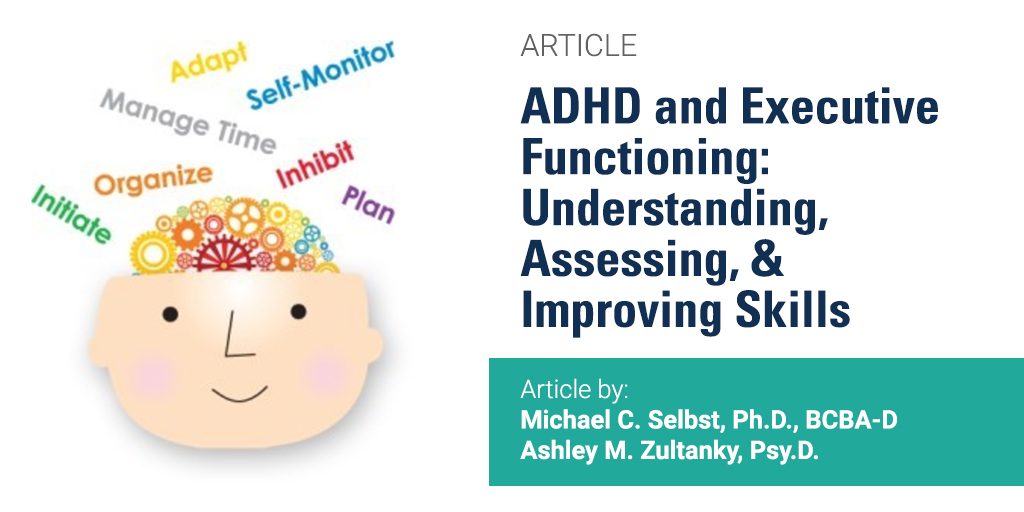by Michael C. Selbst, Ph.D., BCBA-D & Ashley M. Zultanky, Psy.D.
Do you or someone you know have difficulties in the following areas?
- Organization
- Planning and Prioritizing
- Attention
- Starting tasks
- Completing tasks
- Self-monitoring
- Flexibility
- Hyperactivity
- Impulse / behavioral control
- Emotional control
- Memory
- Recall
Difficulties in any of these areas can significantly impact one’s functioning at home, in school, in the workplace, in social relationships, and within the community. Specifically, these can contribute to missing assignments, poor school and work performance, problems with interpersonal relationships, behavior control problems, and executive functioning deficits.
Oftentimes, it is helpful to have an experienced professional assist in providing clear and objective information regarding the individual’s strengths and needs in these areas, identify factors that are getting in the way of one’s success, and help design interventions as part of a comprehensive plan.
After better understanding one’s strengths and weaknesses, carefully designed interventions may be considered, including at least the following:
- Organizing materials at school, home, and/or work
- Deciding what materials to keep or discard, and identifying a place for each item
- Organizing tasks and time using a schedule/calendar
- Changing your “To Do List” to your “Success List”, with specific dates and times for each item.
- Prioritize what is most important to do first, then what is the next item, and so on
- Schedule tasks as committed appointments for yourself that are non-negotiable. If you have to change them for an emergency, make sure to immediately reschedule them.
- Increase flexibility by stating focused on what and who is important and being willing to accept changes and challenges that may occur.
- Learn your strengths and weakness, including which strategies are most effective.
- Self-monitor and self-reflect to determine what to do differently the next time.
- Use visual reminders and make associations to strengthen memory skills.
- Notice your thoughts, urges, and feelings and make careful decisions before acting.
- Dedicate time to learn new social-behavior skills and problem-solving strategies.
- Role play new skills to increase mastery and generalization (focused attention and repetition are key!)
Behavior Therapy Associates (BTA) can provide evaluations for children through adults to rule in/out ADHD (with or without hyperactivity/impulsivity), executive functioning deficits, and examine other contributing factors via an ADHD evaluation, Neuropsychological Evaluation, and/or Psychological / Psychoeducational Evaluation. Interventions may include individual therapy, family therapy, psychological / executive coaching, school-based consultation, and behavioral parent training. We can also provide training to schools, support groups, and organizations.
To learn more, please contact our office at 732-873-1212, email info@behaviortherapyassociates.com or complete the contact form on our website
Michael C. Selbst, Ph.D., BCBA-D is Executive Director of Behavior Therapy Associates. He is a Licensed Psychologist in New Jersey and Pennsylvania, Certified School Psychologist, Board Certified Behavior Analyst at the Doctoral level, and provides Executive Coaching. Dr. Selbst also serves as Co-Executive Director of the HI-STEP® Summer Social Skills Program. He has expertise in the evaluation and treatment of clients who presents with symptoms of anxiety, depression, ADHD, autism spectrum disorder, Asperger’s Syndrome, obsessive-compulsive disorder, mood disorders, oppositional defiant disorder, social skills deficits, learning disabilities, as well as family and relationship issues, parent training, and co-parenting. Dr. Selbst has extensive experience working with pre-school aged children through adults, including expertise helping individuals working through significant life changes and transitions. He has led numerous workshops, including at local, statewide, national, and international conferences. Dr. Selbst assists clients to increase their psychological flexibility, making meaningful steps toward who and what is important to them. He is co-author of the Behavior Problems Resource Kit: Forms and Procedures for Identification, Measurement and Intervention and the social skills curriculum, POWER-Solving®: Stepping Stones to Solving Life’s Everyday Social Problems.
Ashley M. Zultanky, Psy.D. is a clinical psychology Post-Doctoral Fellow at Behavior Therapy Associates and is a Certified School Psychologist in New Jersey. Dr. Zultanky has experience treating children through adults individually and in groups. She has extensive training in neuropsychological, psychological, and psychoeducational assessment of a variety of populations, including learning disability, ADHD, neurodegenerative diseases, epilepsy, tumor, and traumatic brain injury. She has experience with individuals presenting with a variety of issues, including at least the following: depression, anxiety, adjustment issues, ADHD, social skills difficulties, academic and learning difficulties, developmental delays, autism spectrum disorder, anger issues, complicated bereavement, chronic illness, and history of trauma and substance abuse. She also leads social skills training groups for a variety of ages. Dr. Zultanky also has specialized experience in the areas of sport psychology, performance-related difficulties, and executive functioning.
Dr. Selbst and Dr. Zultanky utilize evidence-based approaches, including Acceptance and Commitment Therapy (ACT) and Cognitive Behavior Therapy (CBT).







